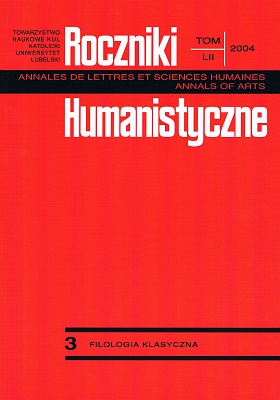“And this is why, seized with great wickedness, you’ll never rid your heart of sad sufferings” – Empedoclean Sin
Abstract
Empedocles of Acragas showed “the history of sin”. From his poem we may learn what the sin consisted in, what was its cause and consequence, as well as how it might be avoided. Empedocles presents some advice that is supposed to help man stay ‘pure’. The one, who stains his hands with blood or commits perjury – for these are the two aspects of Empedocles’s sin – after his death will be driven out of the country of ‘happy gods’. His daimon will ‘purify’ himself in his subsequent incarnations, and at last he’ll have the honor of seeing the immortals again.
References
Ajschylos, Tragedie, przeł. i oprac. S. Srebrny, [Warszawa 19542].
Chodkowski R.R.: Ajschylos i jego tragedie, Lublin 1994.
Diehl E.: Anthologia Lyrica Graeca, vol. 1, Leipzig 1954.
Diels H.: Die Fragmente der Vorsokratiker, hrsg. von W. Kranz, vol. 1, Dublin–Zürich 197216.
Dodds E.R.: Grecy i irracjonalność, Bydgoszcz 2002.
Graves R.: Mity greckie, przeł. H. Krzeczowski, wstępem opatrzył A. Krawczuk, Warszawa 1992.
Inwood B.: Empedocles. A test and translation with an introduction, Toronto–Buffalo–London 1992.
Κελεσιδου Α.: Εμπεδοκλης ο Ακραγαντινος, Αϑηναι 2002.
Liryka starożytnej Grecji, oprac. J. Danielewicz, Warszawa–Poznań 1996.
Martin A., Primavesi O.: L’ Empédocle de Strasburg. (P. Strasb. gr. Inv. 1665-1666), Introduction, édition et commentaire, Berlin 1998.
Morgan K.: Myth and philosophy, Cambridge 2000.
Narecki K.: Logos we wczesnej myśli greckiej, Lublin 1999.
Podbielski H.: Mit kosmogoniczny w Teogonii Hezjoda, Lublin 1978.
Vernant J.-P.: Mit i religia w Grecji starożytnej, Warszawa 1998.
Vlastos G.: Theology and Philosophy in Early Greek Thought, „Philosophical Quartely” 2 (1952), s. 97-123.
Copyright (c) 2004 Roczniki Humanistyczne

This work is licensed under a Creative Commons Attribution-NonCommercial-NoDerivatives 4.0 International License.





